Case Study: Ethical and Legal Implications of ING Accounting Fraud
VerifiedAdded on 2020/06/06
|7
|1650
|67
Case Study
AI Summary
This case study examines the ING accounting fraud that occurred in 2012, where an accountant was charged with stealing approximately $45 million. The assignment delves into the ethical and legal aspects of the fraud, highlighting the violation of accounting principles and code of conduct. It explores the complexities of ethical dilemmas faced by accountants, including the manipulation of financial reports and the misuse of company resources. The study also covers the role of social accounting, corporate responsibility, and the importance of adhering to accounting standards, such as those set by the Australian Accounting Standards Board. The case underscores the impact of unethical behavior on organizations, the importance of strong ethical codes, and the consequences of fraudulent practices, including imprisonment and reputational damage. The conclusion emphasizes the need for strict adherence to accounting rules and the implementation of safeguards to prevent future occurrences of fraud.
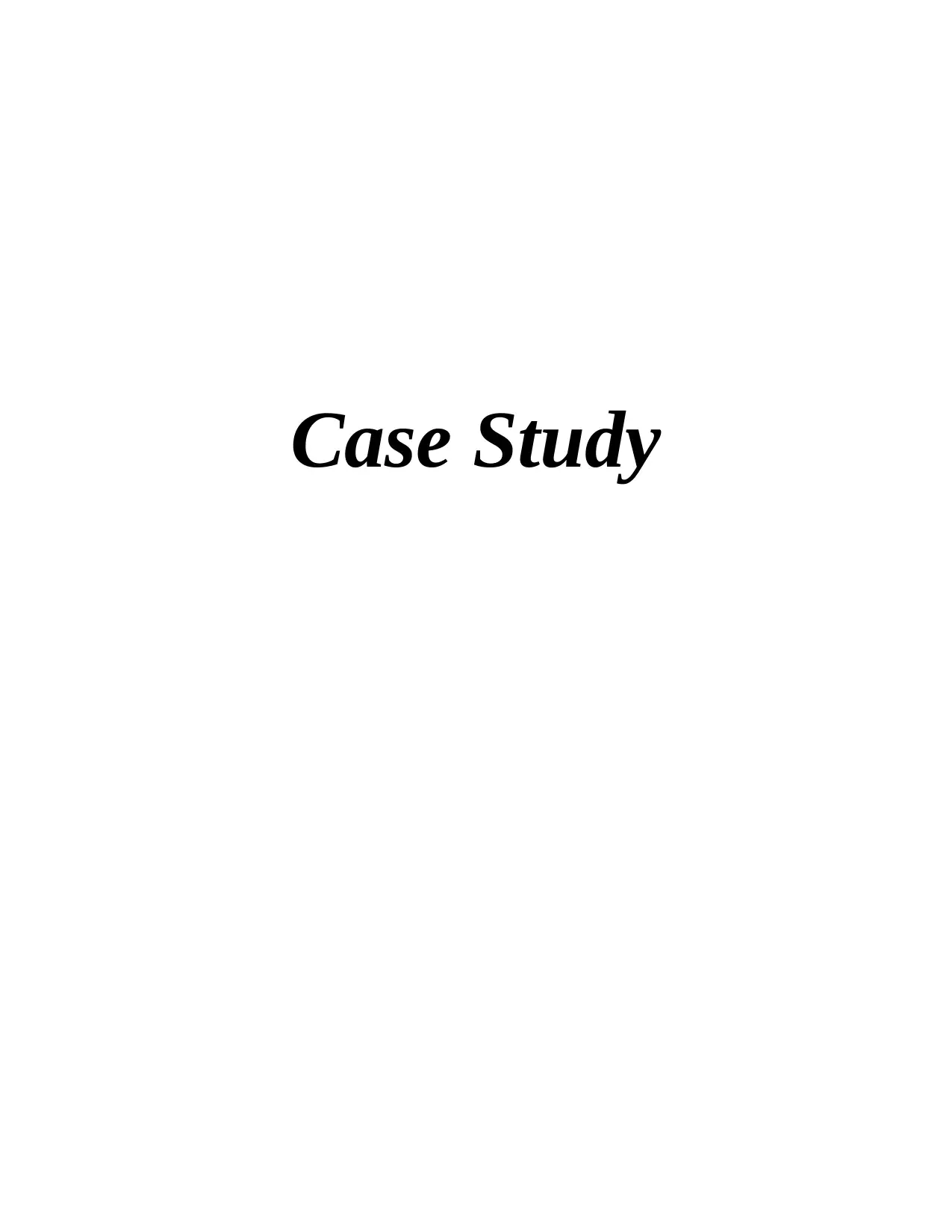
Case Study
Paraphrase This Document
Need a fresh take? Get an instant paraphrase of this document with our AI Paraphraser
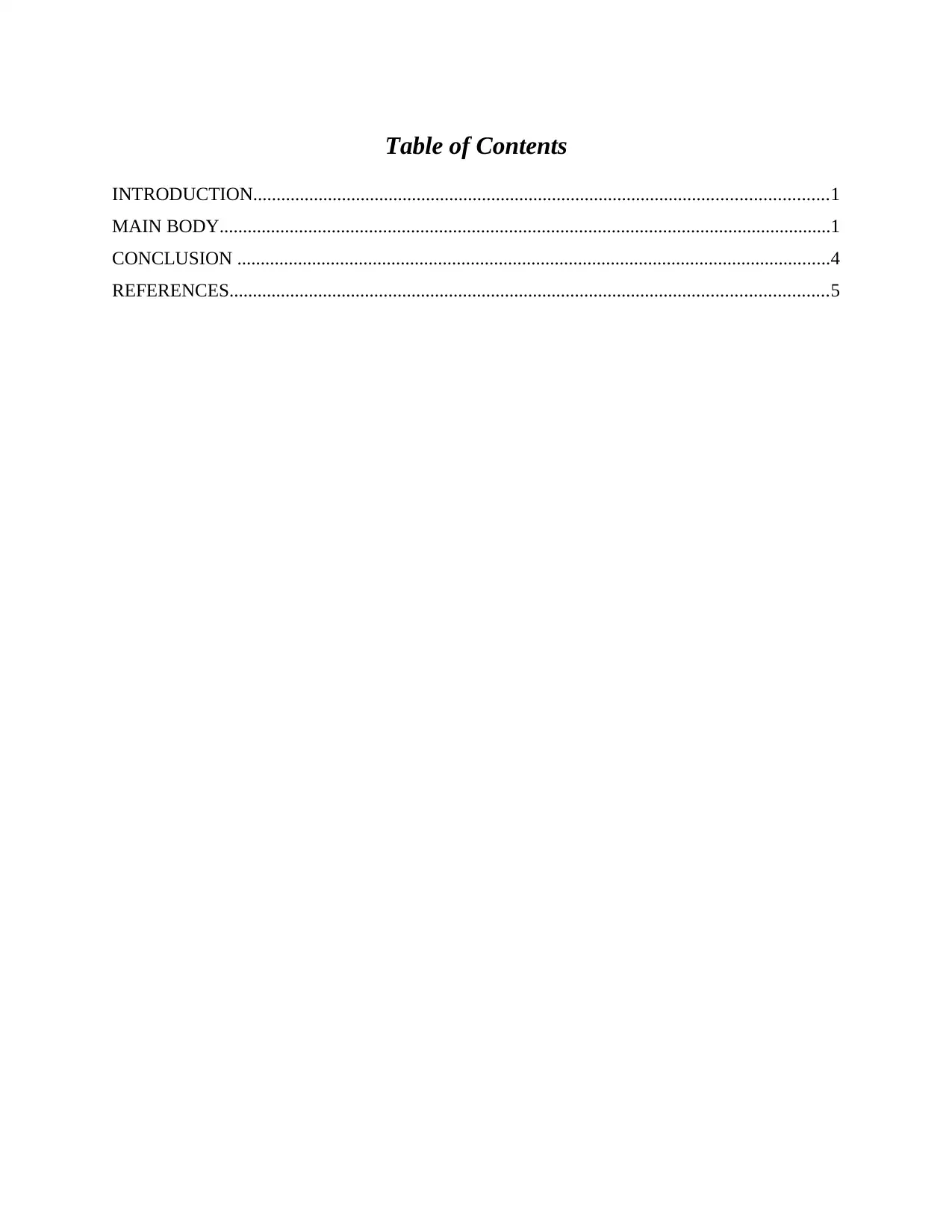
Table of Contents
INTRODUCTION...........................................................................................................................1
MAIN BODY...................................................................................................................................1
CONCLUSION ...............................................................................................................................4
REFERENCES................................................................................................................................5
INTRODUCTION...........................................................................................................................1
MAIN BODY...................................................................................................................................1
CONCLUSION ...............................................................................................................................4
REFERENCES................................................................................................................................5
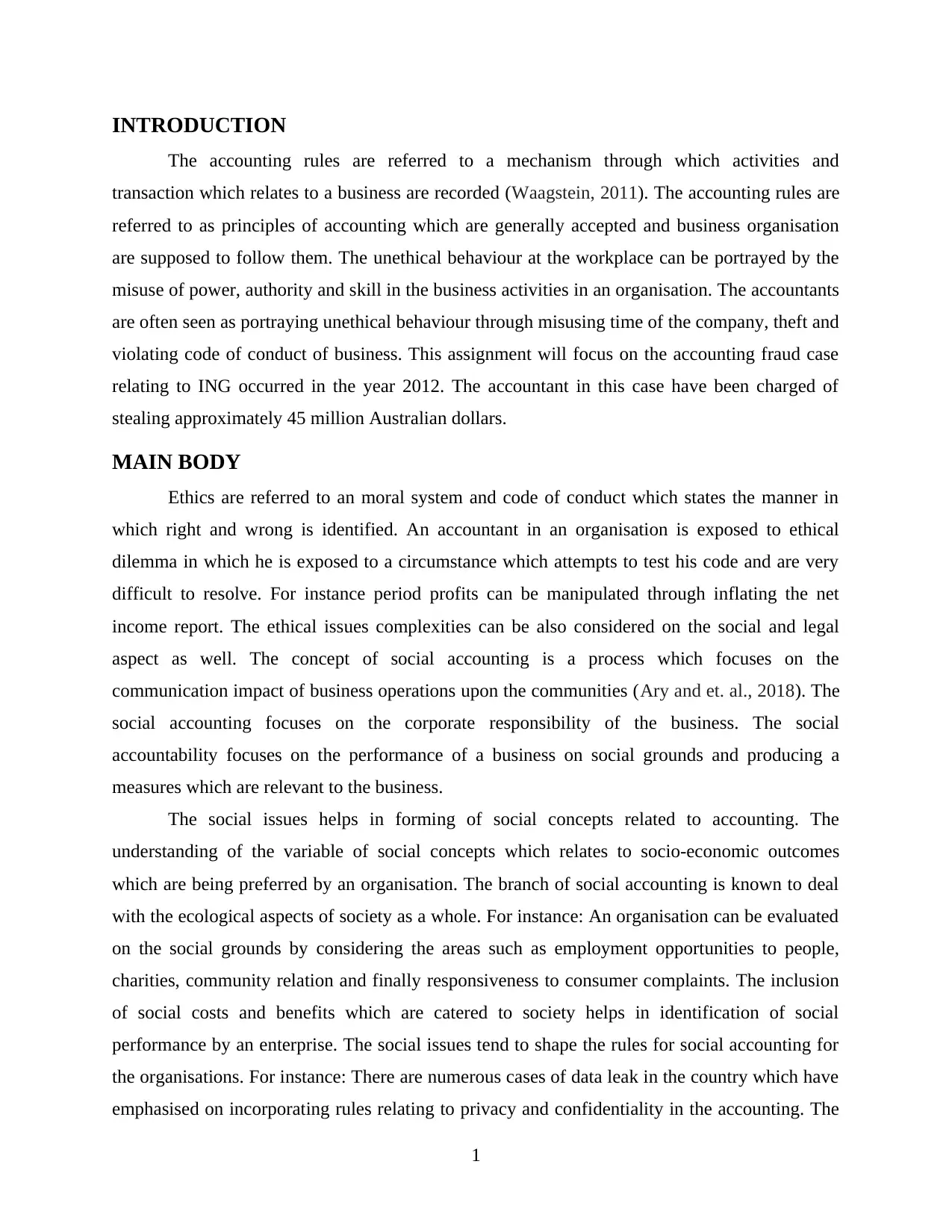
INTRODUCTION
The accounting rules are referred to a mechanism through which activities and
transaction which relates to a business are recorded (Waagstein, 2011). The accounting rules are
referred to as principles of accounting which are generally accepted and business organisation
are supposed to follow them. The unethical behaviour at the workplace can be portrayed by the
misuse of power, authority and skill in the business activities in an organisation. The accountants
are often seen as portraying unethical behaviour through misusing time of the company, theft and
violating code of conduct of business. This assignment will focus on the accounting fraud case
relating to ING occurred in the year 2012. The accountant in this case have been charged of
stealing approximately 45 million Australian dollars.
MAIN BODY
Ethics are referred to an moral system and code of conduct which states the manner in
which right and wrong is identified. An accountant in an organisation is exposed to ethical
dilemma in which he is exposed to a circumstance which attempts to test his code and are very
difficult to resolve. For instance period profits can be manipulated through inflating the net
income report. The ethical issues complexities can be also considered on the social and legal
aspect as well. The concept of social accounting is a process which focuses on the
communication impact of business operations upon the communities (Ary and et. al., 2018). The
social accounting focuses on the corporate responsibility of the business. The social
accountability focuses on the performance of a business on social grounds and producing a
measures which are relevant to the business.
The social issues helps in forming of social concepts related to accounting. The
understanding of the variable of social concepts which relates to socio-economic outcomes
which are being preferred by an organisation. The branch of social accounting is known to deal
with the ecological aspects of society as a whole. For instance: An organisation can be evaluated
on the social grounds by considering the areas such as employment opportunities to people,
charities, community relation and finally responsiveness to consumer complaints. The inclusion
of social costs and benefits which are catered to society helps in identification of social
performance by an enterprise. The social issues tend to shape the rules for social accounting for
the organisations. For instance: There are numerous cases of data leak in the country which have
emphasised on incorporating rules relating to privacy and confidentiality in the accounting. The
1
The accounting rules are referred to a mechanism through which activities and
transaction which relates to a business are recorded (Waagstein, 2011). The accounting rules are
referred to as principles of accounting which are generally accepted and business organisation
are supposed to follow them. The unethical behaviour at the workplace can be portrayed by the
misuse of power, authority and skill in the business activities in an organisation. The accountants
are often seen as portraying unethical behaviour through misusing time of the company, theft and
violating code of conduct of business. This assignment will focus on the accounting fraud case
relating to ING occurred in the year 2012. The accountant in this case have been charged of
stealing approximately 45 million Australian dollars.
MAIN BODY
Ethics are referred to an moral system and code of conduct which states the manner in
which right and wrong is identified. An accountant in an organisation is exposed to ethical
dilemma in which he is exposed to a circumstance which attempts to test his code and are very
difficult to resolve. For instance period profits can be manipulated through inflating the net
income report. The ethical issues complexities can be also considered on the social and legal
aspect as well. The concept of social accounting is a process which focuses on the
communication impact of business operations upon the communities (Ary and et. al., 2018). The
social accounting focuses on the corporate responsibility of the business. The social
accountability focuses on the performance of a business on social grounds and producing a
measures which are relevant to the business.
The social issues helps in forming of social concepts related to accounting. The
understanding of the variable of social concepts which relates to socio-economic outcomes
which are being preferred by an organisation. The branch of social accounting is known to deal
with the ecological aspects of society as a whole. For instance: An organisation can be evaluated
on the social grounds by considering the areas such as employment opportunities to people,
charities, community relation and finally responsiveness to consumer complaints. The inclusion
of social costs and benefits which are catered to society helps in identification of social
performance by an enterprise. The social issues tend to shape the rules for social accounting for
the organisations. For instance: There are numerous cases of data leak in the country which have
emphasised on incorporating rules relating to privacy and confidentiality in the accounting. The
1
⊘ This is a preview!⊘
Do you want full access?
Subscribe today to unlock all pages.

Trusted by 1+ million students worldwide
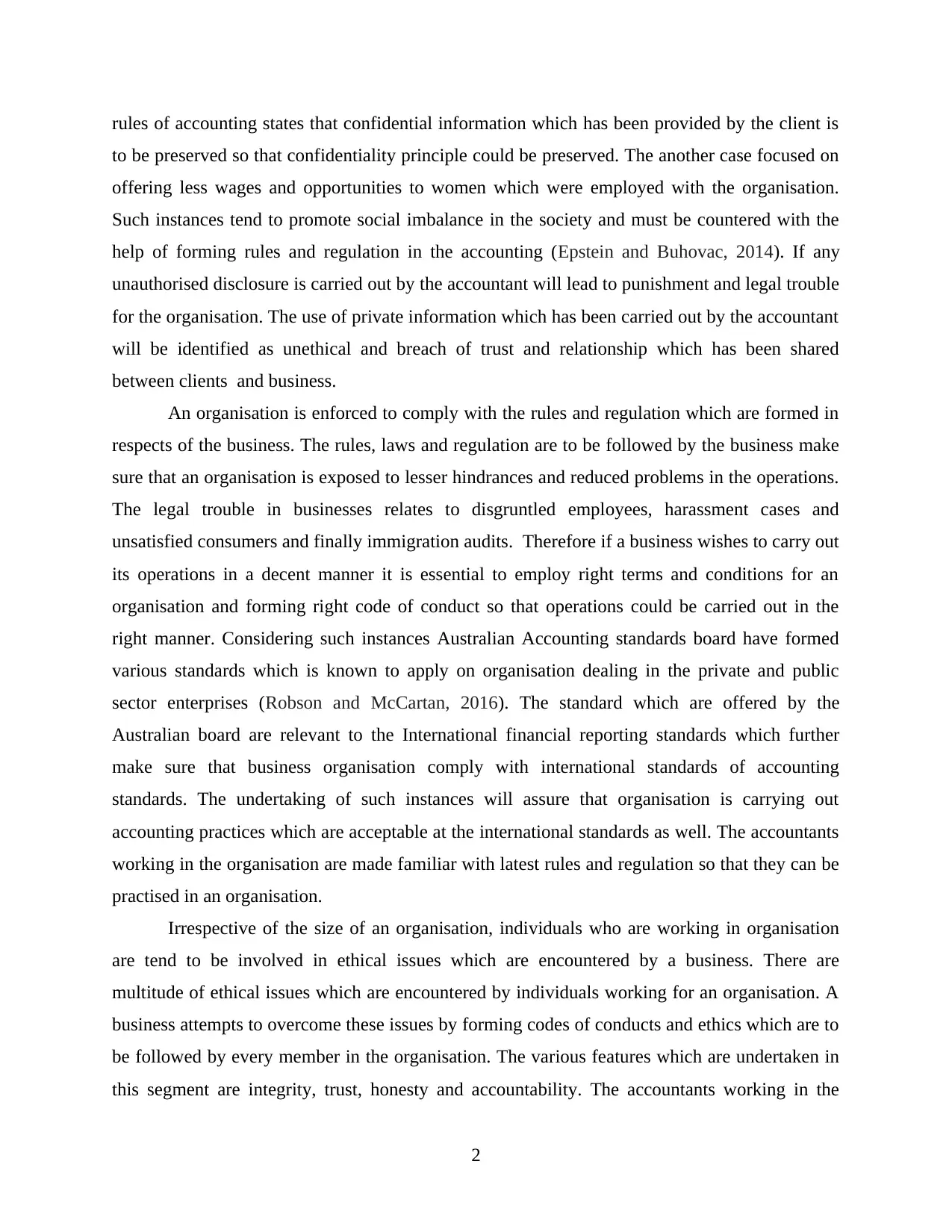
rules of accounting states that confidential information which has been provided by the client is
to be preserved so that confidentiality principle could be preserved. The another case focused on
offering less wages and opportunities to women which were employed with the organisation.
Such instances tend to promote social imbalance in the society and must be countered with the
help of forming rules and regulation in the accounting (Epstein and Buhovac, 2014). If any
unauthorised disclosure is carried out by the accountant will lead to punishment and legal trouble
for the organisation. The use of private information which has been carried out by the accountant
will be identified as unethical and breach of trust and relationship which has been shared
between clients and business.
An organisation is enforced to comply with the rules and regulation which are formed in
respects of the business. The rules, laws and regulation are to be followed by the business make
sure that an organisation is exposed to lesser hindrances and reduced problems in the operations.
The legal trouble in businesses relates to disgruntled employees, harassment cases and
unsatisfied consumers and finally immigration audits. Therefore if a business wishes to carry out
its operations in a decent manner it is essential to employ right terms and conditions for an
organisation and forming right code of conduct so that operations could be carried out in the
right manner. Considering such instances Australian Accounting standards board have formed
various standards which is known to apply on organisation dealing in the private and public
sector enterprises (Robson and McCartan, 2016). The standard which are offered by the
Australian board are relevant to the International financial reporting standards which further
make sure that business organisation comply with international standards of accounting
standards. The undertaking of such instances will assure that organisation is carrying out
accounting practices which are acceptable at the international standards as well. The accountants
working in the organisation are made familiar with latest rules and regulation so that they can be
practised in an organisation.
Irrespective of the size of an organisation, individuals who are working in organisation
are tend to be involved in ethical issues which are encountered by a business. There are
multitude of ethical issues which are encountered by individuals working for an organisation. A
business attempts to overcome these issues by forming codes of conducts and ethics which are to
be followed by every member in the organisation. The various features which are undertaken in
this segment are integrity, trust, honesty and accountability. The accountants working in the
2
to be preserved so that confidentiality principle could be preserved. The another case focused on
offering less wages and opportunities to women which were employed with the organisation.
Such instances tend to promote social imbalance in the society and must be countered with the
help of forming rules and regulation in the accounting (Epstein and Buhovac, 2014). If any
unauthorised disclosure is carried out by the accountant will lead to punishment and legal trouble
for the organisation. The use of private information which has been carried out by the accountant
will be identified as unethical and breach of trust and relationship which has been shared
between clients and business.
An organisation is enforced to comply with the rules and regulation which are formed in
respects of the business. The rules, laws and regulation are to be followed by the business make
sure that an organisation is exposed to lesser hindrances and reduced problems in the operations.
The legal trouble in businesses relates to disgruntled employees, harassment cases and
unsatisfied consumers and finally immigration audits. Therefore if a business wishes to carry out
its operations in a decent manner it is essential to employ right terms and conditions for an
organisation and forming right code of conduct so that operations could be carried out in the
right manner. Considering such instances Australian Accounting standards board have formed
various standards which is known to apply on organisation dealing in the private and public
sector enterprises (Robson and McCartan, 2016). The standard which are offered by the
Australian board are relevant to the International financial reporting standards which further
make sure that business organisation comply with international standards of accounting
standards. The undertaking of such instances will assure that organisation is carrying out
accounting practices which are acceptable at the international standards as well. The accountants
working in the organisation are made familiar with latest rules and regulation so that they can be
practised in an organisation.
Irrespective of the size of an organisation, individuals who are working in organisation
are tend to be involved in ethical issues which are encountered by a business. There are
multitude of ethical issues which are encountered by individuals working for an organisation. A
business attempts to overcome these issues by forming codes of conducts and ethics which are to
be followed by every member in the organisation. The various features which are undertaken in
this segment are integrity, trust, honesty and accountability. The accountants working in the
2
Paraphrase This Document
Need a fresh take? Get an instant paraphrase of this document with our AI Paraphraser
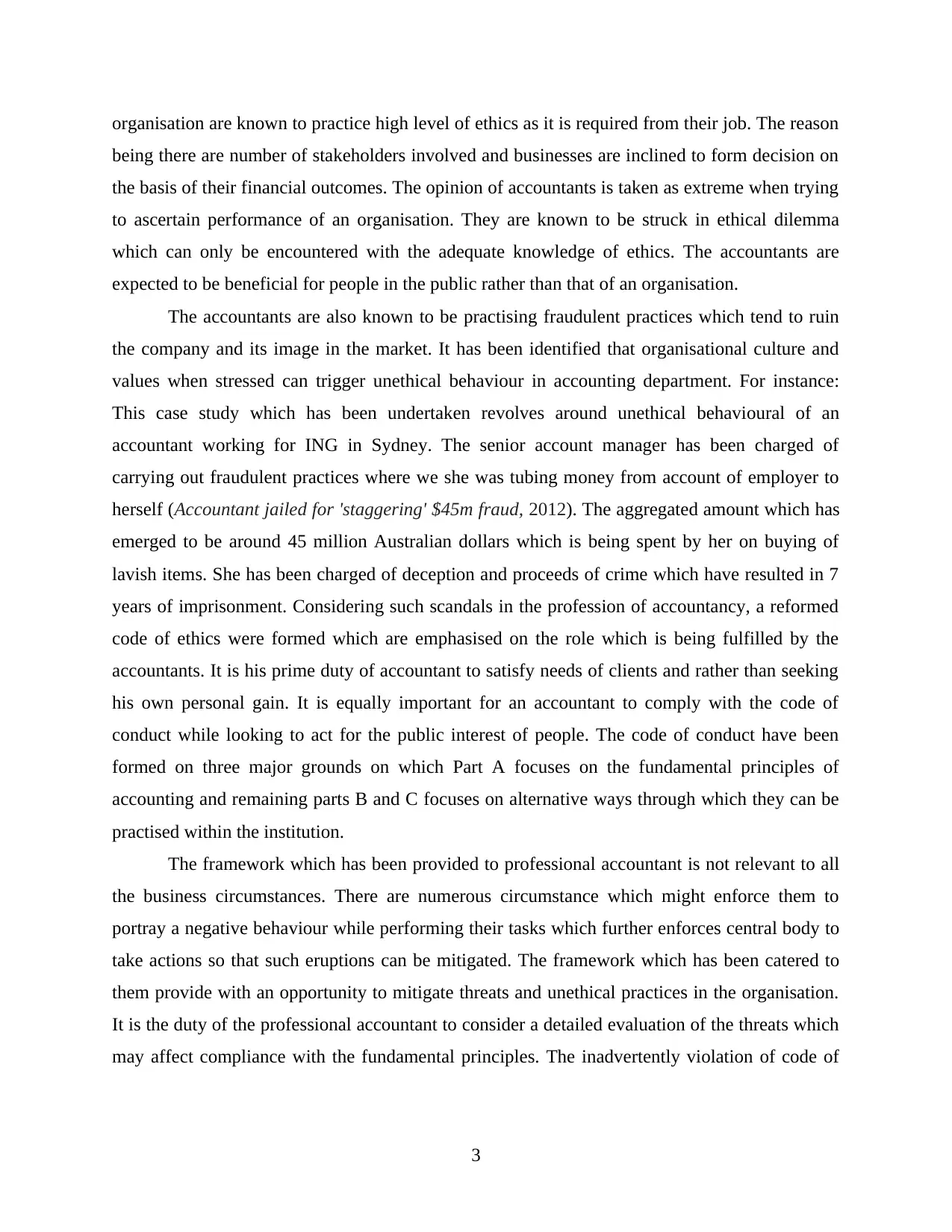
organisation are known to practice high level of ethics as it is required from their job. The reason
being there are number of stakeholders involved and businesses are inclined to form decision on
the basis of their financial outcomes. The opinion of accountants is taken as extreme when trying
to ascertain performance of an organisation. They are known to be struck in ethical dilemma
which can only be encountered with the adequate knowledge of ethics. The accountants are
expected to be beneficial for people in the public rather than that of an organisation.
The accountants are also known to be practising fraudulent practices which tend to ruin
the company and its image in the market. It has been identified that organisational culture and
values when stressed can trigger unethical behaviour in accounting department. For instance:
This case study which has been undertaken revolves around unethical behavioural of an
accountant working for ING in Sydney. The senior account manager has been charged of
carrying out fraudulent practices where we she was tubing money from account of employer to
herself (Accountant jailed for 'staggering' $45m fraud, 2012). The aggregated amount which has
emerged to be around 45 million Australian dollars which is being spent by her on buying of
lavish items. She has been charged of deception and proceeds of crime which have resulted in 7
years of imprisonment. Considering such scandals in the profession of accountancy, a reformed
code of ethics were formed which are emphasised on the role which is being fulfilled by the
accountants. It is his prime duty of accountant to satisfy needs of clients and rather than seeking
his own personal gain. It is equally important for an accountant to comply with the code of
conduct while looking to act for the public interest of people. The code of conduct have been
formed on three major grounds on which Part A focuses on the fundamental principles of
accounting and remaining parts B and C focuses on alternative ways through which they can be
practised within the institution.
The framework which has been provided to professional accountant is not relevant to all
the business circumstances. There are numerous circumstance which might enforce them to
portray a negative behaviour while performing their tasks which further enforces central body to
take actions so that such eruptions can be mitigated. The framework which has been catered to
them provide with an opportunity to mitigate threats and unethical practices in the organisation.
It is the duty of the professional accountant to consider a detailed evaluation of the threats which
may affect compliance with the fundamental principles. The inadvertently violation of code of
3
being there are number of stakeholders involved and businesses are inclined to form decision on
the basis of their financial outcomes. The opinion of accountants is taken as extreme when trying
to ascertain performance of an organisation. They are known to be struck in ethical dilemma
which can only be encountered with the adequate knowledge of ethics. The accountants are
expected to be beneficial for people in the public rather than that of an organisation.
The accountants are also known to be practising fraudulent practices which tend to ruin
the company and its image in the market. It has been identified that organisational culture and
values when stressed can trigger unethical behaviour in accounting department. For instance:
This case study which has been undertaken revolves around unethical behavioural of an
accountant working for ING in Sydney. The senior account manager has been charged of
carrying out fraudulent practices where we she was tubing money from account of employer to
herself (Accountant jailed for 'staggering' $45m fraud, 2012). The aggregated amount which has
emerged to be around 45 million Australian dollars which is being spent by her on buying of
lavish items. She has been charged of deception and proceeds of crime which have resulted in 7
years of imprisonment. Considering such scandals in the profession of accountancy, a reformed
code of ethics were formed which are emphasised on the role which is being fulfilled by the
accountants. It is his prime duty of accountant to satisfy needs of clients and rather than seeking
his own personal gain. It is equally important for an accountant to comply with the code of
conduct while looking to act for the public interest of people. The code of conduct have been
formed on three major grounds on which Part A focuses on the fundamental principles of
accounting and remaining parts B and C focuses on alternative ways through which they can be
practised within the institution.
The framework which has been provided to professional accountant is not relevant to all
the business circumstances. There are numerous circumstance which might enforce them to
portray a negative behaviour while performing their tasks which further enforces central body to
take actions so that such eruptions can be mitigated. The framework which has been catered to
them provide with an opportunity to mitigate threats and unethical practices in the organisation.
It is the duty of the professional accountant to consider a detailed evaluation of the threats which
may affect compliance with the fundamental principles. The inadvertently violation of code of
3
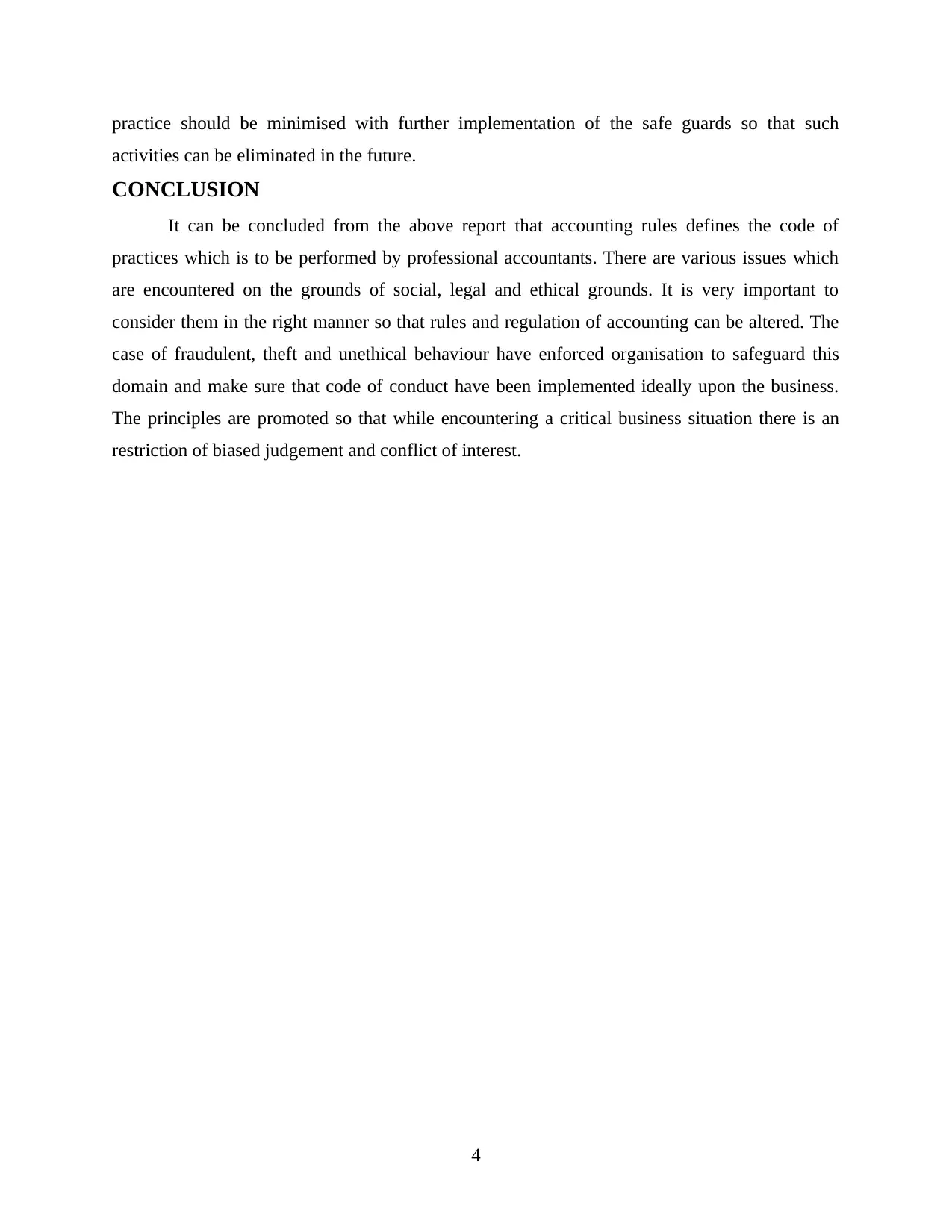
practice should be minimised with further implementation of the safe guards so that such
activities can be eliminated in the future.
CONCLUSION
It can be concluded from the above report that accounting rules defines the code of
practices which is to be performed by professional accountants. There are various issues which
are encountered on the grounds of social, legal and ethical grounds. It is very important to
consider them in the right manner so that rules and regulation of accounting can be altered. The
case of fraudulent, theft and unethical behaviour have enforced organisation to safeguard this
domain and make sure that code of conduct have been implemented ideally upon the business.
The principles are promoted so that while encountering a critical business situation there is an
restriction of biased judgement and conflict of interest.
4
activities can be eliminated in the future.
CONCLUSION
It can be concluded from the above report that accounting rules defines the code of
practices which is to be performed by professional accountants. There are various issues which
are encountered on the grounds of social, legal and ethical grounds. It is very important to
consider them in the right manner so that rules and regulation of accounting can be altered. The
case of fraudulent, theft and unethical behaviour have enforced organisation to safeguard this
domain and make sure that code of conduct have been implemented ideally upon the business.
The principles are promoted so that while encountering a critical business situation there is an
restriction of biased judgement and conflict of interest.
4
⊘ This is a preview!⊘
Do you want full access?
Subscribe today to unlock all pages.

Trusted by 1+ million students worldwide
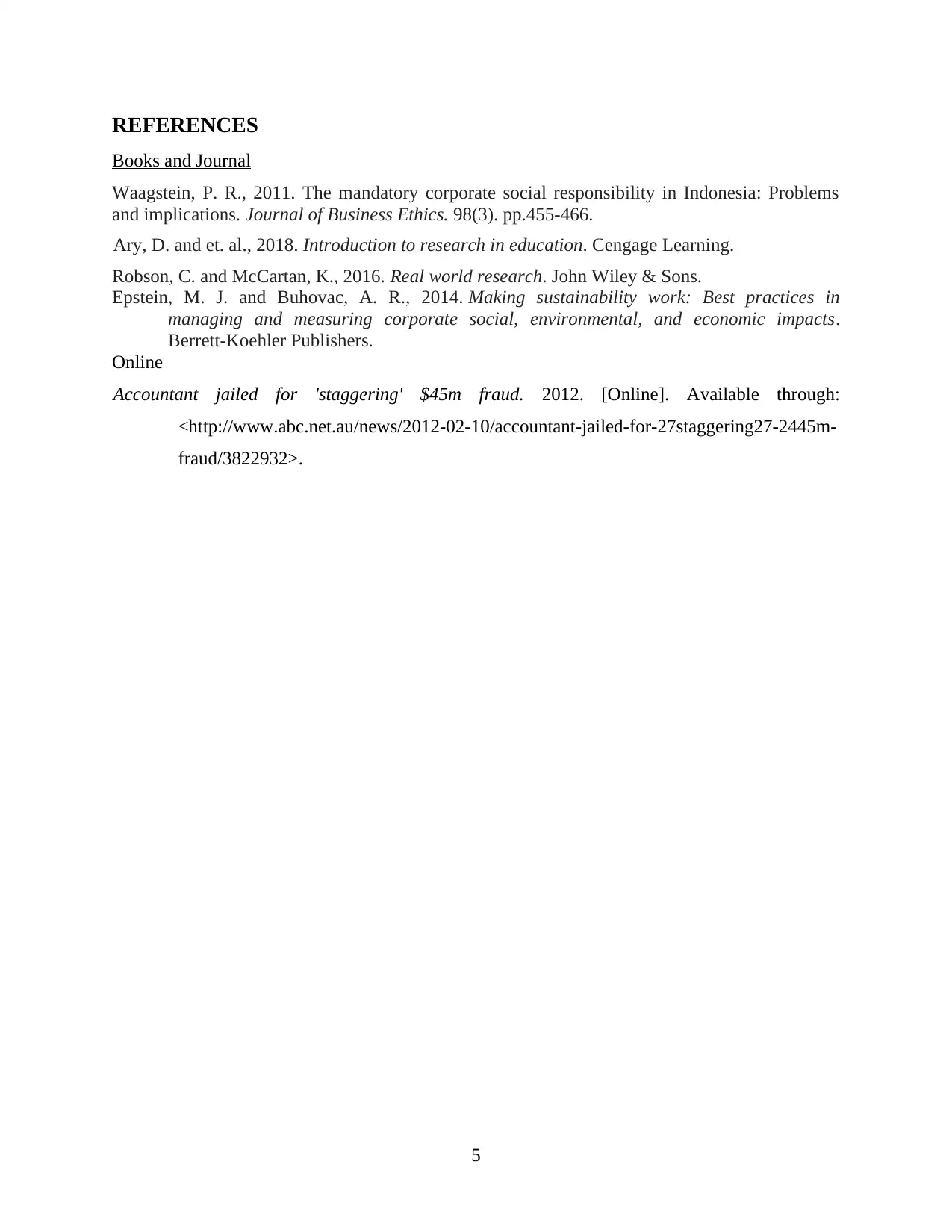
REFERENCES
Books and Journal
Waagstein, P. R., 2011. The mandatory corporate social responsibility in Indonesia: Problems
and implications. Journal of Business Ethics. 98(3). pp.455-466.
Ary, D. and et. al., 2018. Introduction to research in education. Cengage Learning.
Robson, C. and McCartan, K., 2016. Real world research. John Wiley & Sons.
Epstein, M. J. and Buhovac, A. R., 2014. Making sustainability work: Best practices in
managing and measuring corporate social, environmental, and economic impacts.
Berrett-Koehler Publishers.
Online
Accountant jailed for 'staggering' $45m fraud. 2012. [Online]. Available through:
<http://www.abc.net.au/news/2012-02-10/accountant-jailed-for-27staggering27-2445m-
fraud/3822932>.
5
Books and Journal
Waagstein, P. R., 2011. The mandatory corporate social responsibility in Indonesia: Problems
and implications. Journal of Business Ethics. 98(3). pp.455-466.
Ary, D. and et. al., 2018. Introduction to research in education. Cengage Learning.
Robson, C. and McCartan, K., 2016. Real world research. John Wiley & Sons.
Epstein, M. J. and Buhovac, A. R., 2014. Making sustainability work: Best practices in
managing and measuring corporate social, environmental, and economic impacts.
Berrett-Koehler Publishers.
Online
Accountant jailed for 'staggering' $45m fraud. 2012. [Online]. Available through:
<http://www.abc.net.au/news/2012-02-10/accountant-jailed-for-27staggering27-2445m-
fraud/3822932>.
5
1 out of 7
Related Documents
Your All-in-One AI-Powered Toolkit for Academic Success.
+13062052269
info@desklib.com
Available 24*7 on WhatsApp / Email
![[object Object]](/_next/static/media/star-bottom.7253800d.svg)
Unlock your academic potential
Copyright © 2020–2026 A2Z Services. All Rights Reserved. Developed and managed by ZUCOL.





